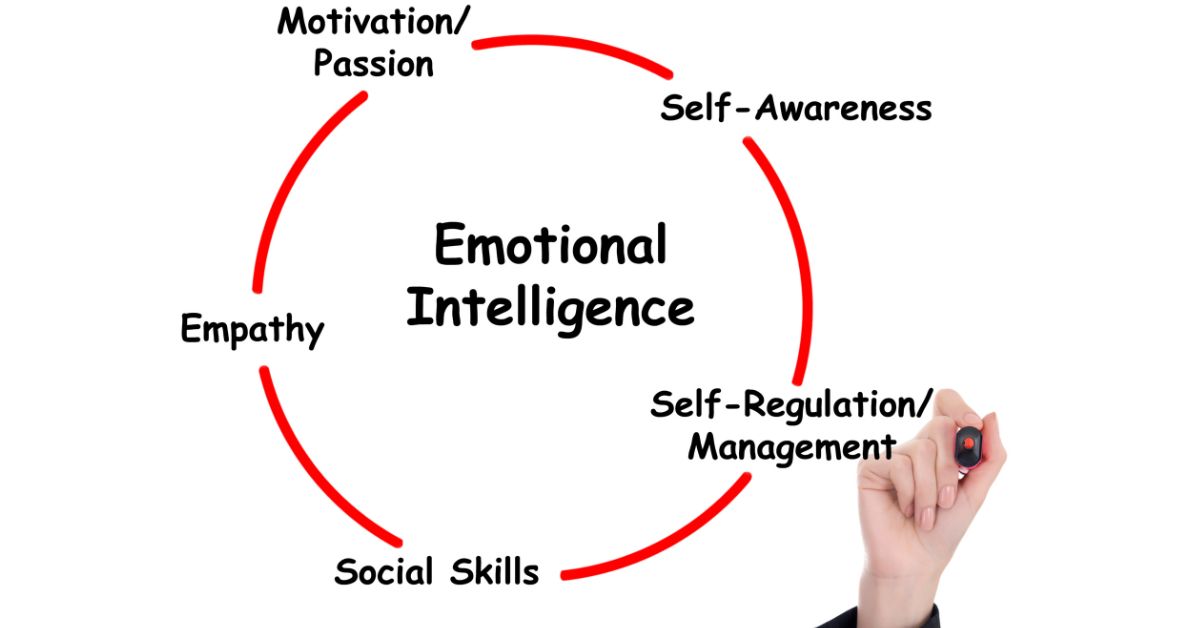Hey there, unstoppable friend!
Today, we're diving into the incredibly powerful world of emotional intelligence (EI/EQ) – a secret weapon that every growth-minded achiever needs in their toolkit. People with high EQs are less stressed, better communicators, more empathetic, and more easily overcome challenges. They are seen as more compassionate, inspirational and confident. As a result, they are more influential in the world and have higher states of well-being.
I'm a firm believer that emotional intelligence is the secret superpower to achieving success in both our personal and professional lives.
But, let's face it – it's a skill that seems to be in short supply in today's fast-paced world. I've noticed how emotional intelligence is being taught to young children in school, but when it comes to adults, there's a significant gap in training and resources.
That's why I took it upon myself to dive deep into the world of emotional intelligence, pursuing specialized training and eventually becoming a certified EI Coach. My mission? To help amazing people like you develop and nurture this essential skill for a more fulfilling life.
Emotional intelligence is so crucial to thriving in all aspects of life that I couldn't resist writing about it today, hoping to inspire and empower you on your journey towards greater self-awareness and emotional mastery.
What to expect in today's blog:
- Definition of emotional intelligence
- Examples of what EI looks like
- A list of 5 key components of EI
- 5 practical tips to practice EI in your daily life.
Let's set the stage for the rest of this story by defining emotional intelligence.
EI or EQ is the ability to recognize, understand, manage, and use your own emotions and the emotions of others in a healthy and effective way.
The American psychologist and science journalist Daniel Goleman first coined the term emotional intelligence. He wrote for the New York Times for over 12 years, reporting on the complexity of the human brain and behavioral sciences [1].
Goleman’s EQ theory comprises five core components: empathy, effective communication or social skills, self-awareness, self-regulation, and motivation.

Emotional Intelligence is the key to unlocking better decision-making, improved relationships, and overall success in life. To have it means you are very aware of emotions and the message they are here to share.
The good news is that emotional intelligence is a skill that can be developed. So, if you weren't born naturally aware and calm, don't worry. You can learn this skill.
One of the obstacles to developing high EQ is fear of emotions. Many people are afraid of their emotions. They have never taken the time to explore them.
But if you understand that emotions are merely messengers of information, you can feel more comfortable getting curious about the message. What is this emotion trying to tell me or teach me?
Perhaps many people don't quite know what emotional intelligence is. But they can easily recognize when someone doesn't possess it.
Social media is filled with videos sharing blow-ups in public spaces when someone didn't get their way, brawls after someone was offended by some criticism (real or perceived), insensitivity to someone else's needs.
These may be more dramatic examples of poor emotional intelligence.
But perhaps you've been on the receiving end of someone who could not control their temper, someone who shut down and froze when faced with a high pressure conversation, or another who blurted out anything that was on their mind, regardless of the feelings of the people around them.
How did those situations turn out? Probably not so well.
Now, imagine that person being able to handle these situations with grace and ease, without being overwhelmed by their emotions, to think clearly and respond rather than react.
Can you see the difference in the results in either of these situations?
What if I told you emotional intelligence is that skill that can help you navigate these moments like a pro, while staying calm, collected, and in control of your emotions?
That's the power of emotional intelligence!
Here are 5 components of an emotionally intelligent person.

1. Emotional self--awareness: the foundation of EI
Imagine that high-stakes situation – the pressure is on, and you're feeling anxious.
An emotionally intelligent person can recognize this emotion and take a step back to assess the situation before acting on it. By understanding their emotions and the impact they have on their thoughts and actions, they can make better decisions in the heat of the moment.
Emotional self-awareness means being able to recognize and name your emotions so you understand why you are feeling the way you do. It also means you are aware of your own personal strengths and weaknesses.
With emotional self-awareness, you can take control of your reactions and set yourself up for success.

2. Empathy: The key to connecting with others
Ever wonder how some people just seem to "get" others? That's empathy.
An emotionally intelligent person can sense and understand the emotions of others, which leads to stronger connections and relationships. They can move from focusing solely on their own reactions and step into another's shoes to see their side of the situation as well.
Imagine being the go-to person in your social circle or at work, the one to whom everyone feels comfortable opening up. Your empathy will help you build trust, navigate conflicts, and ultimately thrive in your personal and professional life.

3. Emotional self- regulation: Keeping cool under pressure
We've all been there – emotions are running high, and it's hard not to react impulsively. But an emotionally intelligent person can keep their emotions in check and respond in a thoughtful, measured way. Instead of using strong emotions in a destructive way, they can redirect them into a constructive, positive result. This is what makes people with high EQ very influential leaders and team players.
When faced with a challenging situation, you might take a few deep breaths, count to ten, or take a pause in your own way to regroup and stay focused on the bigger picture.
This level-headed approach is a game-changer for decision-making, problem-solving, and even your overall well-being.

4. Social Skills: The art of communication
Did you know that strong social skills can propel your success both personally and professionally?
Emotionally intelligent people are masters at communication, negotiation, and collaboration. They can read a room, adapt their communication style to different situations, and handle conflicts with grace.
Imagine the impact this can have on your career, relationships, and overall happiness!

5. Motivation: Channeling emotions for success
An emotionally intelligent person can harness their emotions to fuel their motivation and drive.
They understand the power of positive emotions and use them to push through challenges and achieve their goals. By channeling your emotions effectively, you can become a force to be reckoned with – unstoppable in your pursuit of success!
So, how does emotional intelligence affect your decisions?
Simple! When you're in tune with your emotions and the emotions of others, you can make more informed, rational, and effective decisions in every aspect of your life.
Now that we've covered the basics, let 's explore some practical tips to help you build your emotional intelligence and become an unstoppable force in life.
Here are 5 Practical Tips to Build Emotional Intelligence
1. Practice active listening
Next time you're in a conversation, really focus on what the other person is saying. Put away distractions, maintain eye contact, and show genuine interest. This will help you better understand their emotions and thoughts, strengthening your empathy and social skills.
2. Reflect on your emotions
Take a few minutes each day to check in with yourself and identify the emotions you're experiencing. Ask yourself why you're feeling this way and how these emotions may be influencing your actions. If you don't quite know what you are feeling, learn how to name your emotions with tools like the emotions wheel. The more you understand your emotions, the better equipped you'll be to manage them effectively.
3. Seek feedback from others
We all have blind spots, especially when it comes to our emotions. Reach out to friends, family, or colleagues for their perspective on your emotional intelligence. Be open to their feedback and use it as a learning opportunity to grow.
4. Learn to self-regulate
We all experience stress, but how we deal with it can impact our emotional intelligence. Experiment with different stress-relief techniques, like deep breathing, exercise, or meditation, to find what works best for you. Learn to see challenges as opportunities. Believe that you always have a choice on how to respond. Mastering stress management will help you maintain emotional balance even in challenging situations.
5. Surround yourself with emotionally intelligent people
You know the saying, "you are the average of the five people you spend the most time with"? Well, it's true! Surround yourself with emotionally intelligent people who inspire and challenge you to grow. Their positive influence will rub off on you and help you build your emotional intelligence.
Get the best results with the right mindset!
Someone who is fixed in their ways and is not willing to adapt and change will struggle with emotional intelligence. Be willing to embrace change and uncertainty, practice cultivating deeper EI and you will set yourself up for success in life!
Ready to Master Your Emotions?
By implementing these energizing tips into your daily life, you'll cultivate a stronger sense of resilience, empowering you to overcome obstacles, learn from your experiences, and ultimately, achieve your full potential.
Get on the wait list for the upcoming "Rise and Shine Collective", an online monthly membership community for ambitious achievers and leaders where you will strengthen your resiliency, confidence, power thinking and emotional intelligence skills to make better decisions, adapt quicker to stress and uncertainty, proactively solve problems and grow an empowered mindset.
Remember… you are a powerful, radiant being, capable of achieving your wildest dreams. It's time to silence that nagging voice of doubt, embrace your unique strengths, and unleash your true potential.
No matter the challenges you face, remember that you have the power within you to bounce back and reach your full potential.
You are capable, You are strong, and You are worthy of living your best life!
Ready to Unleash Your Full Potential with 10 New Breakthrough Beliefs?
Get the FREE Guide and Get Started Today!
